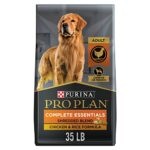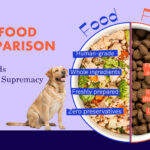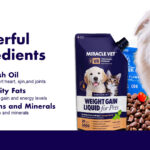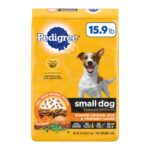The best dog food for a pregnant dog is rich in protein and essential nutrients like folic acid and DHA. High-calorie diets that support growth are vital during this stage.
Pregnant dogs have unique dietary needs to support their health and the development of their puppies. Nutrition plays a pivotal role in the successful outcome of pregnancy and the future well-being of the puppies. A diet specially formulated for pregnant dogs should have an optimal balance of proteins, fats, vitamins, and minerals.
It is essential to choose a high-quality dog food brand that caters to the increased caloric demands of gestation and lactation. Look for foods with real meat, wholesome grains, and a comprehensive list of vitamins and minerals to ensure the mother dog maintains body condition while also feeding her growing litter. Careful selection of nourishing dog food during pregnancy lays the foundation for healthy pups and a smooth birthing process.
Special Diets For Expecting Canines
Welcome to the essential guide for tailoring diets to support the health and well-being of expecting canine mothers. Understanding the importance of proper nutrition for pregnant dogs is critical for their health and that of their offspring. As these future moms carry new life, their bodies require a refined balance of nutrients to ensure a healthy gestation period.
Importance Of Specialized Nutrition During Pregnancy
When it comes to pregnant dogs, the phrase “eating for two” takes on a whole new level of importance. Nutritional demands increase significantly as the puppies grow, making specialized diets indispensable. Optimal nutrient intake is not just about quantity but also about the quality and balance of the diet to sustain both the mother and her developing puppies. Vets and canine nutritionists often emphasize the need for a high-energy, high-protein diet that is easily digestible and rich in essential vitamins and minerals.

Nutritional Requirements and Changes In Pregnant Dogs
The progression of pregnancy brings about profound changes in a dog’s nutritional needs. Initially, the focus is on maintaining a healthy weight. Yet, as pregnancy advances, caloric intake should gradually increase. Experts typically recommend a step-up approach where food portions are increased by small increments as the pregnancy progresses. Here are the critical nutritional requirements changes:
Use of bullet points to list key nutritional requirements
- Protein: Essential for fetal development and milk production.
- Fats: Provide a concentrated energy source.
- Calcium and Phosphorus: Crucial for healthy skeletal development.
- Folic Acid: Supports proper growth and spinal health.
- Iron: Necessary for hemoglobin production, which increases by about 50% during pregnancy.
Use of a table to represent the gradual increase in food portions
| Stage of Pregnancy | Percentage Increase |
|---|---|
| 1-4 weeks | 10% |
| 5-6 weeks | 20% |
| 7-9 weeks | 30-50% |
A vet-recommended pregnancy diet might incorporate a blend of high-grade commercial food with natural sources of essential nutrients, ensuring optimal health. Always bear in mind the necessity for clean, fresh water available at all times, as hydration plays a critical role in a healthy pregnancy.
In crafting the ideal dietary regimen for your expecting pooch, close attention to these details is paramount. A carefully selected diet for pregnant dogs supports robust pups and a smooth delivery, making this time an exhilarating journey rather than a source of stress.
Understanding Canine Gestational Nutrition
Welcome to the intricate world of understanding canine gestational nutrition. The period of pregnancy for your four-legged companion is both thrilling and crucial for the puppies’ growth and the mother’s health. Just like humans, a pregnant dog has unique dietary requirements to support her body and the developing fetuses. In this blog post, get ready to delve into the specifics of gestational dietary needs and learn how a balanced diet plays a pivotal role in fetal development.
Overview Of Gestational Dietary Needs
The window of gestation in dogs is relatively short, spanning approximately 9 weeks, and during this phase, the mother’s nutritional needs change progressively. An expectant dog requires more calories, proteins, and certain minerals and vitamins to support healthy puppies. It is essential to:
- Increase caloric intake: By the third trimester, her caloric requirements may rise by 30 to 50 percent.
- Enhance protein levels: Protein is crucial for the development of healthy puppies and the maintenance of the mother’s muscle mass.
- Adjust calcium and phosphorus ratios: These minerals are vital for proper skeletal development.
- Incorporate essential fatty acids: Omega-3 fatty acids like DHA contribute to the development of the brain and eyes in puppies.
Monitor these changes by working with a veterinarian to ensure a tailored diet plan that suits the specific breed and health status of the pregnant dog.

Role Of A Balanced Diet In Fetal Development
An optimal balance of nutrients during pregnancy is non-negotiable to ensure the delivery of healthy pups. A balanced diet is the cornerstone for:
- Preventing birth defects: Adequate levels of vitamins and minerals help minimize the risks of congenital disabilities.
- Supporting placental health: Nutrients directly influence the health of the placenta, which in turn nourishes the developing puppies.
- Reducing complications during birth: A well-nourished mother is less likely to encounter birthing difficulties due to improved overall health.
It’s not just about more food—it’s about the right food. The goal is to cater to the mother’s increased nutritional demands without causing excessive weight gain that could lead to complications during delivery.
Transitioning to a high-quality, nutrient-dense food specifically formulated for pregnant dogs or a “growth and reproduction” stage diet recommended by the Association of American Feed Control Officials (AAFCO) is highly advisable. Always introduce dietary changes gradually to avoid upsetting the dog’s digestive system.
Picking The Right Nutrition Plan for Best Dog Food for a Pregnant Dog
Ensuring optimal health and vitality for a pregnant dog begins with choosing the appropriate nutrition plan. A mother-to-be canine needs a diet rich in essential nutrients to support her gestational journey. In the forthcoming sections, we delve into the key factors to consider and the process to determine the precise caloric intake a pregnant dog requires. This guidance aims to streamline the diet selection for expectant pooches, providing them with the best start for a healthy pregnancy.
Factors Influencing Diet Selection For Pregnant Dogs
Selecting the right diet for your pregnant dog requires understanding several critical factors:
- Stage of Pregnancy: Nutritional needs escalate as pregnancy progresses, peaking during the last few weeks when fetal growth is most rapid.
- Breed Size: Large breeds may need a different nutritional profile compared to smaller breeds.
- Health Status: Pre-existing conditions can influence diet type; always consult your veterinarian.
- Activity Level: Active dogs will require more calories than less active ones.
- Number of Puppies: Litter size impacts nutritional needs; larger litter means greater demand for key nutrients.
Quality of Food: It’s crucial to choose high-quality dog food approved by the Association of American Feed Control Officials (AAFCO). Balancing proteins, fats, carbohydrates, vitamins, and minerals is fundamental for the health of both mom and pups.
Calculating The Ideal Caloric Intake
The caloric needs of pregnant dogs can vary significantly. To calculate the right amount:
- Identify Baseline Needs: Determine your dog’s regular caloric requirements based on her ideal weight.
- Adjust for Pregnancy: As pregnancy progresses, increase her caloric intake. Approximately, a pregnant dog’s energy requirement may increase by 10% each week, reaching up to a 50-60% increase by the time of whelping.
- Monitor and Modify: Monitor her weight and body condition, adjusting the diet as necessary to ensure she doesn’t gain too much or too little weight.
| Stage of Pregnancy | Caloric Increase | Notes |
|---|---|---|
| 1-4 weeks | +10% each week | Initial stage; moderate increase. |
| 5-9 weeks | Up to 50-60% total increase | Peak growth period; substantial increase. |
Monitor Progress: Regular check-ups with a veterinarian are essential. They provide valuable insights into your dog’s health status and help adjust her diet as needed.

Dog Food Ingredients To Prioritize
Ensuring your pregnant dog receives optimal nutrition is crucial for the health of the mother and the proper development of her puppies. It requires a delicate balance of the right ingredients, tailored to support the increased nutritional demands. Let’s delve into the essential components that should be prioritized in dog food for expectant canines.
Essential Vitamins And Minerals For Pregnant Dogs
The development of healthy puppies starts with a well-balanced diet rich in vitamins and minerals. Prioritize dog foods that contain the following:
- Folic Acid: Essential for proper embryonic development.
- Iron: Supports the increased blood volume in pregnant dogs.
- Calcium: Crucial for the development of bones and teeth in puppies and to prevent milk fever post-birth.
- Phosphorus: Works with calcium to enhance bone growth and maintenance.
Choose dog food formulas that are labeled as ‘complete and balanced,’ as these will generally include a comprehensive blend of the necessary nutrients.
Importance Of Dha And Epa In Dog Pregnancy Diets
DHA (Docosahexaenoic Acid) and EPA (Eicosapentaenoic Acid) are omega-3 fatty acids that play a vital role in the development of the brain and vision in puppies. Ensure the dog food for your pregnant pooch includes sources of these essential nutrients, such as:
| Source of DHA/EPA | Benefits |
|---|---|
| Fish Oil | Supports brain development and cognitive performance in puppies. |
| Flaxseed | Provides a plant-based source of beneficial omega-3s. |
Integrating DHA and EPA into the diet of a pregnant dog not only aids in the development of healthy puppies but also helps maintain the mother’s coat condition and skin health.
Best Practices For Feeding Frequency
Ensuring your pregnant dog gets the best nutrition is vital for her health and the health of her puppies. Among the facets of care that demand special attention during this time is feeding frequency. Unlike regular adult dog feeding routines, a pregnant dog’s diet requires tailored modifications to support her changing body and the growing life inside her. Let’s delve deeper into the best practices that would ensure their nourishment needs are adequately met.
Adjusting Meal Portioning and Timing
Adjusting Meal Portioning And Timing
As the pregnancy progresses, a dog’s nutritional needs increase. It’s essential to adjust meal portioning and timing to match her growing demand for energy and nutrients. Initially, you may not need to make significant changes to the amount you feed. However, by the second half of pregnancy, her food intake should increase by up to 50%.
Instead of two large meals, consider offering smaller, more frequent meals to avoid overburdening the digestive system. This helps in maintaining a steady energy level and reducing discomfort as her abdomen expands.
- Start with three small meals a day.
- Gradually increase to four or five as required.
Monitoring Weight Gain During Pregnancy
Monitoring Weight Gain During Pregnancy
Monitoring weight gain during pregnancy is crucial—too much or too little can be a concern. Aim for a steady weight gain; a rule of thumb is about 5-10% increase in weight from the start of the pregnancy to birth. Use a reliable scale and maintain a weekly log to track her progress.
Should there be any drastic weight changes, consult your vet. These could indicate issues in pregnancy, such as overfeeding, underfeeding, or health complications that need immediate attention.
| Week of Pregnancy | Expected Weight Gain |
|---|---|
| Week 1-4 | Minimal to None |
| Week 5-6 | Moderate |
| Week 7-Birth | 5-10% of Starting Weight |

Individual Dietary Adjustments
Expectant canine mothers require a well-balanced diet to support their heightened nutritional needs and those of their growing puppies. Individual Dietary Adjustments are paramount to ensure pregnant dogs receive the necessary energy and nutrients during this critical life stage. It’s not just about feeding more food but providing the right kind of fuel to ensure both mother and offspring thrive. Tailoring the diet to the specific needs of the pregnant dog, including her age, breed, and health status, is essential to her well-being and that of her puppies. Let’s explore how an owner can adapt their furry companion’s diet effectively.
Tailoring Diets To Age, Breed, And Health Status
Each dog is unique and requires a customized diet that caters to their individual requirements. For the well-being of both the pregnant dog and her future litter, here’s what pet owners should consider:
- Age can significantly impact dietary requirements. Older dogs may need easier-to-digest food, while younger dogs might benefit from higher energy content.
- Breed size influences the quantity and type of nutrients needed. Large breeds may need a different balance of minerals to avoid growth-related issues.
- Health status, including pre-existing conditions like diabetes or allergies, must be taken into account when adjusting their diet.
When To Switch From Adult To Pregnancy-specific Dog Food
The transition from adult dog food to a pregnancy-specific formula should begin as soon as pregnancy is confirmed by a veterinarian. This ensures the mother has ample time to adjust to the new diet which supports proper fetal development. Key points to remember include:
- Consult a vet to determine the precise timing and suitable diet brands.
- Gradually introduce pregnancy-specific food over the course of 7-10 days to avoid digestive upset.
- Monitor the dog’s weight and condition to tweak the diet as needed.
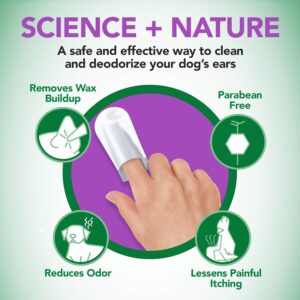
Best Dog Food: Nutrient-packed Picks!
Expectant canine mothers need optimal nutrition to support their health and the health of their growing puppies. The best dog foods for pregnant dogs aren’t just regular chow; they’re specially formulated to provide a balanced diet rich in the essential nutrients required during this critical stage of life.
Premium Foods Meeting Pregnant Dog Requirements
Selecting the right premium dog food is vital for your pregnant dog’s well-being. These products often contain:
- High-quality protein for developing strong muscles and supporting the growth of puppies.
- Fatty acids, like DHA, aid in healthy brain and eye development.
- Increased calorie content to meet the higher energy demands of gestation and lactation.
- Vitamins and minerals in appropriate amounts to promote bone strength and overall health.
Brands like Orijen and Wellness offer such premium options, formulating their foods to fortify the mother and her future litter with nutrient-rich ingredients.
Balanced Commercial Dog Foods For Pregnancy
For dog owners seeking commercial diets that won’t break the bank, there are balanced options that still fulfill a pregnant dog’s nutritional requirements. Look for products with:
- Adequate protein sources such as chicken, lamb, or fish.
- Essential carbohydrates to maintain energy through wholesome grains or vegetables.
- A proper mix of vitamins and minerals, ensures all pregnancy stages are supported.
- Omega fatty acids for continued health of the mother’s skin and coat.
Purina Pro Plan and Hill’s Science Diet offer specialized formulas that cater to the unique dietary needs of pregnant dogs, balancing affordability with the right nutrient profiles to promote a healthy pregnancy.
Evaluating Quality In Dog Food Brands
Choosing the best dog food for a pregnant dog is essential, not only to support her through pregnancy but to lay the groundwork for healthy puppies. Quality nutrition during pregnancy impacts the development of puppies and the mother’s well-being. As pet owners explore an array of dog food brands on the market, it is critical to evaluate the quality of the ingredients and the brand’s reputation to ensure the expected nutritional benefits are met.
Indicators Of High-quality Dog Food
High-quality dog food stands out through several key indicators:
- Nutrient Profile: The food should meet the nutritional levels established by the AAFCO Dog Food Nutrient Profiles for gestation and lactation.
- Meat as the First Ingredient: Look for dog food where real meat, meat meal, or fish is listed as the top ingredient, providing the essential proteins needed.
- No By-Products or Fillers: High-quality dog food will not include meat by-products, corn, soy, wheat, artificial flavors, colors, or preservatives.
- Fatty Acids: Essential fatty acids like Omega-3 and Omega-6 are crucial for fetal development and the health of the mother during pregnancy.
- Probiotics and enzymes: A good dog food brand will incorporate these for the digestive health of the pregnant dog.
Top Reviewed Brands for Pregnant dogs:
Several brands have been consistently top-reviewed and recommended by veterinarians and dog nutritionists for pregnant dogs:
| Brand | Key Benefits | Protein Source |
|---|---|---|
| Orijen | Rich in protein, uses fresh, regional ingredients. | Chicken, turkey, fish |
| Blue Buffalo | Life Protection Formula is specially designed for pregnant dogs. | Deboned chicken, fish meal |
| Wellness CORE | Grain-free, packed with antioxidants, probiotics, vitamins, and minerals. | Turkey, chicken meal, salmon oil |
When selecting food for a pregnant dog, consider your dog’s individual needs, existing health conditions, and any dietary restrictions. Consult with a veterinarian to ensure the chosen brand meets the nutritional requirements specific to your dog’s pregnancy.
Homemade Diets Versus Store-bought
Expectant canine mothers require the finest nutritional support to nourish their growing puppies. Pet owners often weigh the pros and cons of homemade diets versus store-bought dog food during this special time. Choosing the right food for a pregnant dog is crucial to ensuring the health of both the mother and her offspring. Homemade meals and store-bought options each have their own unique benefits and downsides, warranting a detailed exploration of their comparative effectiveness and the importance of well-rounded nutrition.
Comparative Effectiveness Of Homemade Meals
The debate between homemade meals and commercial dog food is ongoing, especially for pregnant dogs that require an enhanced diet. Homemade meals enable complete control over the ingredients, allowing for the exclusion of fillers and potential allergens found in some commercial foods. However, are they as effective as the specially formulated store-bought varieties?
- Customization: Homemade diets can be tailored to a dog’s specific needs during pregnancy, including calorie, protein, and nutrient requirements.
- Safety: Preparing food at home reduces the risk of contamination and recalls associated with commercial products.
- Palatability: Freshly prepared meals can be more appealing, encouraging consistent eating habits in finicky or nauseous pregnant dogs.
On the flip side, homemade diets can fall short without proper knowledge of canine nutrition, potentially leading to deficiencies that could harm both the pregnant dog and her developing puppies.
Ensuring Home-prepared Diets Are Well-rounded
To support optimal fetal development and maternal health, a well-rounded diet is essential. This means incorporating all necessary vitamins, minerals, proteins, fats, and carbohydrates in appropriate ratios.
| Ingredient | Benefit | Example Source |
|---|---|---|
| Protein | Supports growth | Lean meats, eggs |
| Fats | Provides energy | Fish oil, flaxseed |
| Carbohydrates | Supplies calories | Brown rice, vegetables |
| Vitamins & Minerals | Ensures overall health | Organ meats, certain fruits and veggies |
Drafting a diet plan with a veterinarian or a canine nutritionist is critical to ensuring that all nutritional bases are covered. Adding a prenatal vitamin supplement is often recommended to bridge any gaps in a home-prepared diet.
Monitoring the dog’s weight gain, appetite, and overall health throughout her pregnancy provides valuable data for possible diet adjustments. Expert consultation ensures that each meal contributes to a healthy pregnancy and a robust litter.
Safety Of Raw Diets For Pregnant Dogs
Determining the optimal nutrition for a pregnant dog is crucial to ensuring the health of both the mother and her developing puppies. Many pet owners explored the idea of raw diets during this critical period. The notion of providing a natural, ancestral diet to pets can be appealing, but it’s essential to consider the safety and implications of raw foods, especially for pregnant dogs whose nutritional needs are heightened.
H3 Heading: Risks and Benefits Perspective
Risks And Benefits Perspective
The debate around feeding raw diets to pregnant dogs is one that requires a balance between potential risks and possible benefits. Here is a quick look at the key points to consider:
- Nutritional Balance: Raw diets might provide a range of nutrients in their most natural state, potentially benefiting the mother’s and puppies’ health when carefully balanced.
- Immune System Support: Advocates suggest that raw food diets can boost the immune system, vital for a pregnant dog.
- Pathogen Risk: The threat of bacterial contamination is a significant concern, with pathogens such as Salmonella and Listeria endangering both the mother and her unborn puppies.
- Digestive Issues: Pregnant dogs may have sensitive digestive systems, and the introduction of a raw diet could lead to gastrointestinal upset.
H3 Heading: Expert Opinions on Raw Food Regimes During Gestation
Expert Opinions On Raw Food Regimes During Gestation
Veterinary professionals and canine nutrition experts often weigh in on this topic, bringing forth a wealth of information for pet owners to consider:
| Expert | Opinion | Recommendation |
|---|---|---|
| Veterinarians | Many veterinarians exercise caution due to the potential risk of bacteria and nutritional imbalances in raw diets. | Adopt a scientifically formulated diet tailored for pregnant dogs that meet established guidelines. |
| Canine Nutritionists | Some nutritionists may support raw diets but emphasize the importance of a diet meticulously balanced for gestational needs. | Consider a professionally designed raw diet, ensuring it is appropriately supplemented and tested for pathogens. |
While a tailored raw food diet might offer excellent nutrition when administered correctly, the consensus suggests that the risks during pregnancy are often deemed too great without thorough research and expert guidance. Deciding on whether to provide a raw diet to a pregnant dog should involve a deep dive into factual information and consultation with veterinarians who understand the intricacies of canine maternal health.
Hydration And Supplements Addition
Transitioning gracefully into motherhood, a pregnant dog requires not just love and comfort but also a meticulously planned diet. As a pet parent, understanding the nuances of Hydration and supplement addition becomes imperative. The right balance of fluids and essential supplements ensures the well-being of both the mother and her puppies.
Ensuring adequate water intake for pregnant dogs
Ensuring Adequate Water Intake For Pregnant Dogs
Dehydration in pregnant dogs can lead to critical health issues, affecting both the expecting mother and her offspring. Vigilance in the water supply is non-negotiable. Aim for continuous access to clean, fresh water, replenishing it several times a day.
How much water does she need? Typically, a pregnant dog might require up to one and a half times the normal water intake. Adjust this volume in response to her daily activity level and the surrounding temperature.
Necessary dietary supplements for optimal health
Necessary Dietary Supplements For Optimal Health
Enhancing the standard diet of a pregnant dog with nutritional supplements can have a profound impact on prenatal development. It’s essential, however, to consult with a veterinarian before adding any supplements to her diet.
- Folic Acid: Aids in preventing birth defects
- Iron: Crucial for healthy blood cells
- Calcium: Supports bone development
- DHA: Promotes brain and vision health in puppies
The dietary supplement realm is diverse, so an expert opinion ensures the right components in the correct dosages are administered to support the dog’s gestational journey.
Transitioning Back To Regular Food
Transitioning Back to Regular Food is a critical phase in a dog’s life, particularly after the demanding period of pregnancy and lactation. Ensuring your beloved pet returns to her regular diet smoothly can impact her long-term health and vitality. This shift should not be abrupt, as her body needs time to adjust back to pre-pregnancy nutritional needs. Striking the right balance is paramount, so let’s guide you through the process of adjusting the diet for your dog post-pregnancy.
Guidelines For Post-pregnancy Diet Adjustments
- Monitor Body Condition: Regularly assess your dog’s body condition. Aim for a gradual return to her ideal body weight.
- Decrease Calories Gradually: Start by reducing the caloric intake slowly. High-calorie foods required during pregnancy and lactation are no longer necessary.
- Maintain Quality Nutrition: Keep feeding high-quality, balanced food that provides all the essential nutrients.
- Observe Behavior Changes: Watch for any changes in appetite or behavior that may indicate health issues.
- Consult a Veterinarian: Work with your vet to develop an appropriate diet plan tailored to your dog’s specific needs.
When And How To Revert To Standard Adult Food
The timing of transitioning your dog back to her regular adult diet hinges on several factors. These include her return to normal body condition, the weaning of her puppies, and overall health. Typically, this shift should begin once the puppies are around four to six weeks old and starting to eat solid food on their own.
| Weeks After Birth | Action |
|---|---|
| 4-5 Weeks | Begin to reduce intake of puppy food |
| 6-8 Weeks | Incrementally integrate adult dog food into meals |
| 8+ Weeks | Should be fully transitioned to adult food |
To ease the transition:
- Start by mixing a small amount of regular adult dog food with the current pregnancy diet.
- Gradually increase the proportion of adult food over 7-10 days.
- Ensure fresh water is always available as the diet changes.
- Be vigilant for any digestive upsets and be prepared to adjust the pace of transition accordingly.
The journey back to regular food should be a gentle slope, not a steep cliff. Proper nutrition remains an ongoing commitment to her well-being beyond the puppies’ weaning.
Frequently Asked Questions For Best Dog Food For A Pregnant Dog
What Nutrients Do Pregnant Dogs Need?
Pregnant dogs require a balanced diet rich in proteins, fats, vitamins, and minerals to support fetal growth and milk production.
How Often Should Pregnant Dogs Be Fed?
Feed pregnant dogs multiple small meals throughout the day during the last few weeks of pregnancy to accommodate reduced stomach space.
Can Pregnant Dogs Eat Puppy Food?
Yes, pregnant dogs can benefit from eating puppy food as it is high in nutrients and energy content, suitable for their increased dietary needs.
Are Supplements Necessary For A Pregnant Dog?
Consult with a vet, as some pregnant dogs may need supplements like folic acid or calcium, depending on their diet and health status.
What To Avoid Feeding A Pregnant Dog?
Avoid feeding pregnant dogs foods high in artificial additives, excessive calcium, and empty calories that don’t provide nutritional value.
Is Raw Food Diet Safe For Pregnant Dogs?
Raw food diets carry a risk of bacterial contamination and aren’t recommended for pregnant dogs without veterinary guidance and strict hygiene practices.
When To Switch To A Dog Pregnancy Diet?
Begin transitioning to a diet specifically formulated for pregnant dogs as soon as pregnancy is confirmed or advised by a vet.
Conclusion
Choosing the ideal nutrition for your expectant canine is pivotal. Select a high-quality, balanced diet that supports both her needs and those of her growing puppies. Remember, consult with your vet to address any dietary adjustments and ensure optimal health. Nourishing your pregnant dog properly sets the stage for a healthy litter and a thriving mother.


